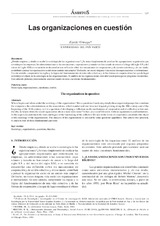Las organizaciones en cuestión
The organizations in question
Autor
Urteaga, Eguzki
Editor
Asociación de Estudios de Ciencias Sociales y HumanidadesFecha
2011Materia
SociologíaOrganizaciones
Cuestiones
Teorías
Organizations
Questions
Theories
Sociology
METS:
Mostrar el registro METSPREMIS:
Mostrar el registro PREMISMetadatos
Mostrar el registro completo del ítemResumen
¿Dónde empieza y dónde se acaba la sociología de las organizaciones? ¿Se trata simplemente de analizar las agrupaciones organizadas que constituyen las empresas, las administraciones o las asociaciones, cuyo número y tamaño no han cesado de crecer a lo largo del siglo XX y del inicio del siglo XXI, o es cuestión de desarrollar una reflexión sobre los mecanismos de cooperación y de acción colectiva y, de ese modo, contribuir a pensar la organización social en un sentido más amplio? De hecho, no existe ninguna vida social sin organizaciones e instituciones. En este sentido, comprender las reglas y la lógica del funcionamiento de esta vida colectiva y de las formas de cooperación a las que da lugar constituye el objeto de la sociología de las organizaciones. El análisis de las organizaciones está atravesado por algunas preguntas recurrentes. Este artículo pretende precisamente analizar cuatro de estas cuestiones fundamentales. Where begins and where ended the sociology of the organizations? It is a question of analyzing simply these organized groups that constitute the companies, the administrations or the associations, which number and size have not stopped growing along the 20th century and of the beginning of the 21 th century, or it is a question of developing a reflection on the mechanisms of cooperation and of collective action and, thereby, to help to think the social organization about a more wide sense? In fact, any social life exists without organizations and institutions. In this aspect, to understand the rules and logics of the functioning of the collective life and of the forms of cooperation constitutes the object of the sociology of the organizations. The analysis of the organizations is crossed by some questions appellants. This article tries precisely to analyze four of these fundamental questions.

